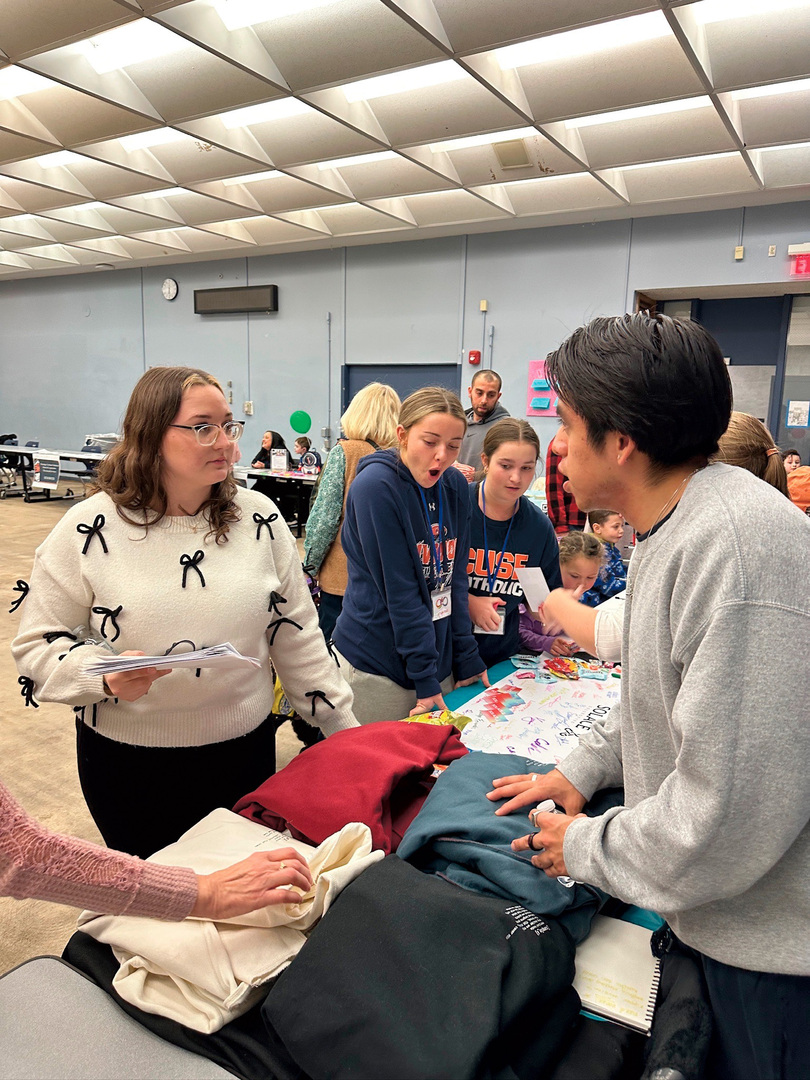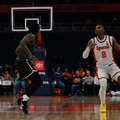Solace Collective provides neurodivergent considerations to fashion

Solace, a clothing company created by Syracuse University students, highlights the fashion needs of people who are neurodivergent. Courtesy of Aidan Turner
Get the latest Syracuse news delivered right to your inbox.
Subscribe to our newsletter here.
After a job interview in 2023, interviewers criticized Carolyn Fernandes for picking at her nails throughout the conversation. But for the Syracuse University senior, moving and fidgeting is a part of everyday life. She wondered how she would ever get by if something so innate for her wouldn’t be accepted in a professional environment.
Fernandes’ struggles aren’t a singular experience. Lucas d’Oelsnitz, another SU senior, deals with anxiety and ADHD. Now, d’Oelsnitz and Fernandes work as project coordinator and industrial designer, respectively, for Solace Collective.
“What makes me want to join (a project) is when I see myself as the customer,” d’Oelsnitz said.
Solace is a startup clothing brand focusing on the needs of neurodivergent people through garments designed to incorporate fidgeting or anxiety-relief. d’Oelsnitz and Fernandes collaborate with team coordinator Aidan Turner and six other SU students who work on branding, fashion design and engagement.
Solace’s name comes from the Latin root sol, meaning sun. Its motto, “reassurance and warmth,” represents what the brand hopes to provide for people who are neurodivergent, Fernandes said.
Currently, the Solace brand consists of four samples the company received from a garment factory based on its designs. Each is a matching hoodie or sweatshirt and sweatpant set that focuses on addressing a different aspect of neurodivergent needs. A gray hoodie with slashes in the arms reveals red fabric, which the wearer can weave their fingers in and out of, providing a built-in fidget.
The hoodie and sweatpants are double-lined, so the wearer can customize the garment by cutting their own rips in it. Fernandes pictures this being useful for a student who’s especially struggling to focus during class.
A main challenge of developing clothing for customers who are neurodivergent is that one specialization won’t fit everyone’s needs or preferences, Turner said. One approach Solace has taken to this problem is Turner’s favorite design, a red crew neck and sweatpants set that appears standard at first glance.
Upon a closer look, the cuffs of both the sweatshirt and sweatpants have a piece of exposed elastic that the wearer can choose to leave intact or cut, based on their preference. The feeling of a tight cuff on a sweatshirt or pant leg can be overstimulating for some wearers, Turner said.
“People are divided,” Turner said. “Some people prefer one way. Some people prefer the other way. What we’re doing here is trying to solve this with one garment.”
Another sample is a lightweight, breathable white sweatshirt designed with minimal seams, specifically excluding seams underneath the armpit. Fernandes said the sweatshirt’s fashionable, rugged look combines style with accessibility. The fourth sweatshirt incorporates discrete fidgeting with textured fabrics tucked into the pockets.
The Solace team prioritizes direct feedback from people who are neurodivergent, Turner said. The team hosted 10 tabling events in the past two weeks in busy locations around SU, inviting any student, neurodivergent or not, to try on the garment samples and give feedback. Participants can even enter themselves to win free clothes by filling out an online feedback form.
“The message and the purpose of the brand is probably one of the strongest things that we have,” Turner said. “We are designing directly with neurodivergent individuals. We’re saying, ‘Hey, come try these garments on. We want to know what works. We want to know what doesn’t work.’”
The idea for Solace was developed in Intelligence ++, an initiative which includes a two-semester course that focuses on creating products for people with disabilities. Turner said that out of all the products developed in the class, Solace is the only one on track to reach the marketplace.
d’Oelsnitz said Solace applied for and received a $5,000 grant from Intelligence ++, which they poured into the four industrial samples they use for the customer feedback events. Turner said that when he realized ordering their first full set of inventory would cost tens of thousands of dollars, he understood how hard the path ahead might be.
“There’s been plenty of ‘oh sh*t,’ moments, where the world seems like it’s kind of caving in on you, and you’ve got to fight through,” Turner said. “I mean, long nights, early mornings, that’s a given.”
The Solace team has applied for numerous grants to fund their initial round of production, and are currently semi-finalists of Panasci, a Martin J. Whitman School of Management business competition. They’ve also been accepted to the finals of New York Business Plan Competition. d’Oelsnitz said that though significant funds are needed to get the brand off the ground, the team is optimistic.
The team plans to launch pre-orders in early May, shortly after a few of the members graduate. Fernandes and d’Oelsnitz want to turn Solace into their full-time jobs, though d’Oelsnitz plans on taking a job in finance until the brand takes off. He feels anxious about the shift from a college startup to a functional company.
“Right now, I’m having fun doing something I’m passionate about, but once we launch, it becomes real, it becomes a job, and it becomes a tremendous commitment,” d’Oelsenitz said. “I’m excited for it, but obviously at that point, the risk really kicks up.”
d’Oelsnitz said that despite the risk and anxiety, members of the Solace team are assured they will be successful after receiving feedback from consumers. He thinks people are inspired to lend their support to Solace because they have family and friends who are neurodivergent, and can recognize that the products will be effective for them.
Today’s clothing market isn’t addressing neurodivergence, Fernandes said. She hopes people will walk away from Solace understanding that considerations for neurodivergence aren’t only needed, but will soon be a market trend on par with recent sustainability-focused initiatives.
“It’s not only huge because it includes a lot of the stuff I need for my neurodivergence, but we’re creating a more inclusive world so everyone can succeed, and not the ‘neuro-norm’ can succeed,” Fernandes said.
The Solace team hopes to expand beyond sweatsets into business casual clothing, attempting to address Fernandes’ interview situation directly. d’Oelsnitz said the team is also interested in developing undergarments, sportswear or even features that customers can buy separately and attach to clothes they already own.
Turner said there’s always an inkling of anxiety in the back of his mind reminding him that the startup might not work out. But he thinks a healthy amount of doubt and worry is essential for a business: especially when paired with the positive attitude and dependable team he said Solace relies on.
“We know that the purpose, the reason why we’re all doing this, it’s for the greater good,” Turner said. “It’s making people’s lives better, and I’m willing to lose sleep over that any day of the week.”






